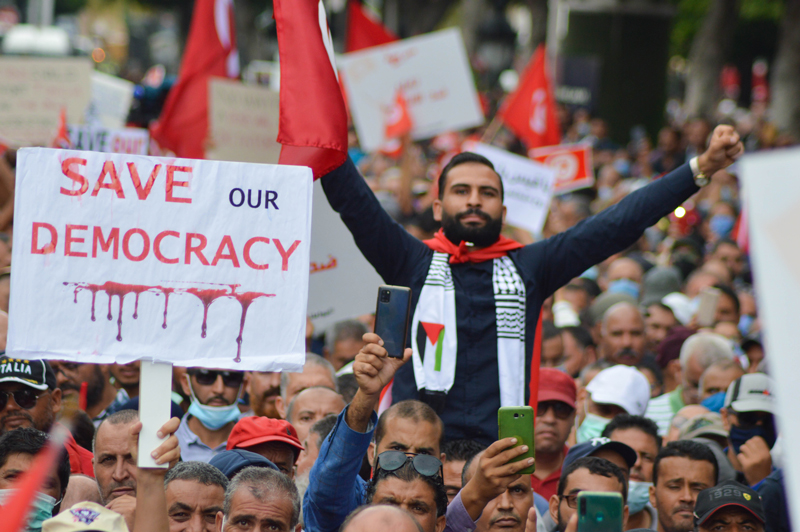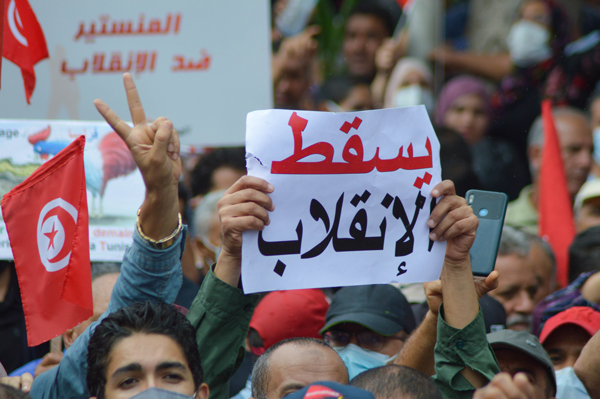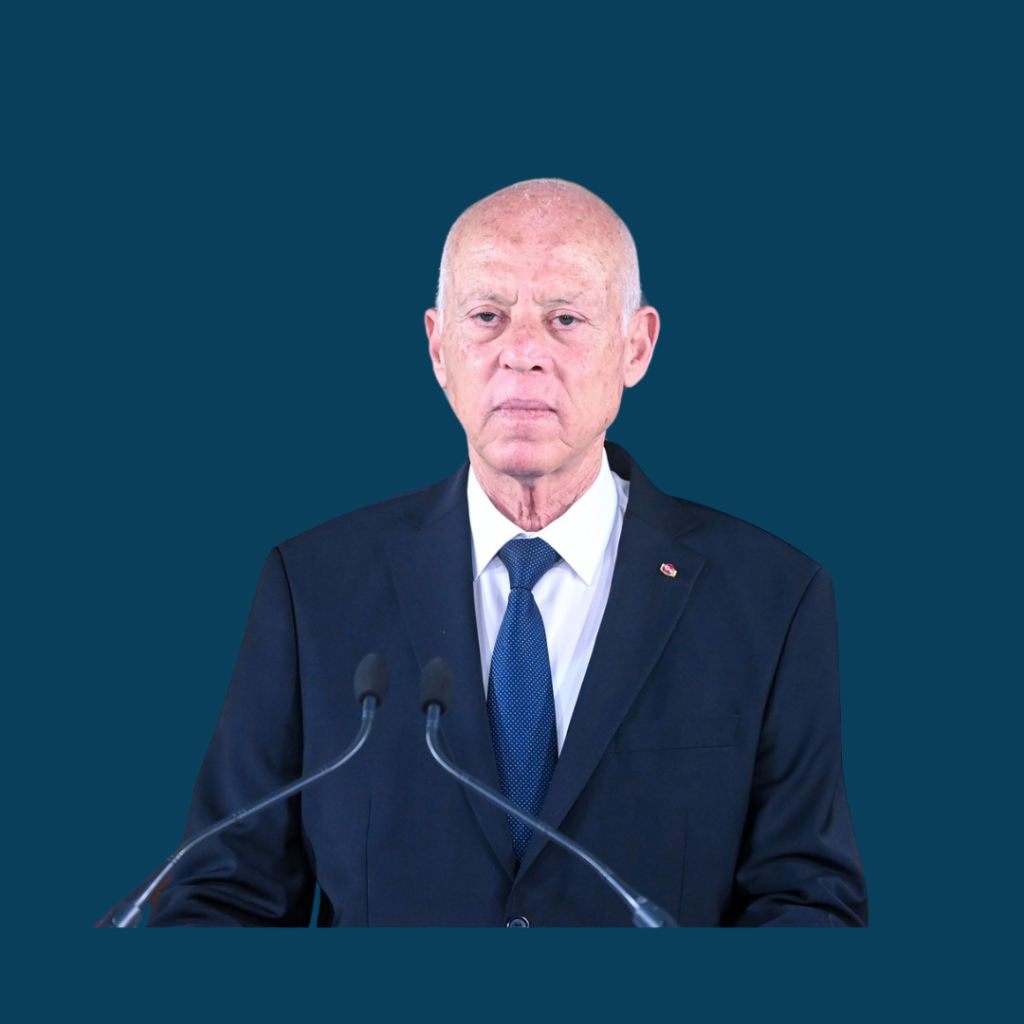
The country’s authoritarian turn under incumbent President Kais Saied and months of rampant repression against his political opposition, the press, and civil society ensured that the election was neither free nor fair.
MEDC’s Tunisia election monitor documents and contextualizes election violations, providing a 1) data tracker that tallies and categorizes violations; 2) timeline of key events, 3) candidate profiles, including excluded presidential hopefuls, and, 4) background resources on Kais Saied’s authoritarian toolkit and Tunisia’s electoral process.
Violations are identified by MEDC through open source and observational research. Data begins on July 3, 2024, when the date of the presidential election was announced.

The below tracker tallies and categorizes violations that prevented Tunisia’s presidential election from being free and fair. Click on the icons below for more detailed information about each type of violation that has occurred since the presidential election was announced. The below data was last updated on October 22, 2024. View further information on individual violations here.
The below timeline includes key events that prevented a free and fair election, including arrests, political developments, and judicial actions beginning July 3. For more information on each entry, click view source.
Kais Saied, who first won Tunisia’s presidency in 2019, ran for reelection after spending his first term dismantling the country’s young democracy through a series of power grabs that began in July 2021. Saied has infringed on the fundamental freedoms of Tunisians and dismantled many of the constraints on his power.
Here are some of the key mechanisms Saied has used to consolidate his authoritarian rule and prevent a free and fair election:

Another tool essential in Saied’s authoritarian turn has been his repression of free expression, which you can read more about in MEDC’s report by Justin Shilad.
The following candidates were approved by the ISIE, Tunisia’s election authority, to run in the presidential election.
The following individuals had their candidacies rejected by the ISIE, but Tunisia’s Administrative Court ruled that they should be included on the ballot. The ISIE refused to implement the court rulings, even though they were legally binding.
The following candidates sought to run for president but were either not approved by the ISIE or prevented from submitting their candidacies, while others chose to withdraw their candidacies in protest of a rigged process. This list of disqualified candidates is not exhaustive.
To compete in the October 6 presidential election, would-be candidates were required to register their candidacies with Tunisia’s electoral commission, the Independent High Authority for Elections (ISIE), by August 6. The ISIE approved the candidacies of Ayachi Zammel, Zouhair Maghzaoui, and the incumbent, Kais Saied, but rejected the candidacies of fourteen other presidential hopefuls.
Seven presidential hopefuls appealed the ISIE’s decision to exclude their candidacies with the Administrative Court, the judicial body with oversight power over the ISIE. The Administrative Court ruled in favor of three candidates, Abdellatif Mekki, Imed Daimi, and Mondher Zenaidi, but the ISIE, in an unprecedented move, refused to implement the Administrative Court’s legally-binding rulings and excluded all three hopefuls from the ballot. In response to this electoral crisis, Tunisia’s parliament passed a law just nine days prior to the election removing ISIE decisions from the Administrative Court’s jurisdiction.
Even before the ISIE’s extraordinary decision, there were numerous reports of election violations and irregularities. As part of submitting their candidacies with the ISIE, presidential hopefuls were required to submit an official document certifying that the presidential hopeful has a clean criminal record. Potential candidates were also required to submit endorsement signatures from 10,000 citizens, as well as 10 signatures from either chamber of parliament or 40 signatures from presidents of government councils at the district, regional, or local levels. Tunisian authorities, however, repeatedly obstructed this process, including denying documents, confiscating some endorsement signature forms, and prosecuting candidates for alleged vote buying.
Worse still, numerous presidential hopefuls and their campaign supporters faced police intimidation, judicial harassment, arrests, and prison sentences. Presidential candidate Ayachi Zammel was arrested after the ISIE approved his candidacy and is currently in prison, while prominent presidential hopefuls Lotfi Mraihi and Abir Moussi are also serving prison sentences. Other opposition leaders who voiced an interest in running for president are similarly in prison, including Ghazi Chaouachi and Issam Chebbi. At least nine other presidential hopefuls were arrested, sentenced, or are facing criminal investigations.
MEDC Copyright 2024
Discriminatory practices in voting will be documented here.
Voter privacy violations that occur will be documented on election day.
Voter intimidation and coercion will be documented here on election day.
Violations of election administration will be documented if they occur on election day.

Kais Saied, the current President of Tunisia and a former law professor, announced that he would run for a second five-year term as Tunisia’s president on July 19, 2024. Almost two years into his first term, Saied seized near-absolute power in July 2021 by removing the prime minister, freezing parliamentary functions, and announcing that he would rule by decree, among other authoritarian measures. Saied has been adamant that there has been no interference in the administration of a free and fair election, even while his political opponents languish in jail.

Zouhair Maghzaoui is the secretary-general of the Echaâb (People’s) Movement, a political party that has historically supported Saied’s presidency and came out in support of Saied’s power-grab. More recently, Maghzaoui has expressed some opposition to Saied’s governance. On August 28, 2024, for example, Maghzaoui held a press conference criticizing election violations and calling on Saied to either become a “normal” candidate, or to step out of the presidential race.

Ayachi Zammel is a chemical engineer and was, until very recently, the head of the Azimoun Movement. A relatively unknown politician, Zammel publicly opposed Saied’s July 2021 power grab as early as June 2022. Since the approval of his candidacy by the ISIE, Zammel has been subjected to intimidation from authorities. Zammel was convicted across multiple cases for allegedly fraudulently collecting endorsement signatures and falsifying documents, and given separate twelve-year, twenty-month, and six-month prison sentences. Despite Zammel’s imprisonment, his campaign team has said that he would stay in the race, and the ISIE has said that Zammel is still eligible to run for president.
Abdellatif Mekki is the president of the Amal w Injaz (Work and Achievement) party and a former Ennahda party official. On August 5, Mekki was sentenced to eight months in prison and banned from running in future elections after being found guilty of allegedly buying votes. Although he is currently not in prison while he appeals the sentence, Mekki is subject to a travel ban and a ban on media appearances, and faces an additional ongoing criminal investigation. Mekki’s candidacy was initially rejected by the ISIE due to an alleged lack of endorsement signatures, but he successfully appealed the ISIE’s decision in front of the Administrative Court. However, the ISIE refused to implement this decision, and Mekki has been excluded from the ballot.
Mondher Zenaidi is a presidential hopeful based in Paris who served as a minister of multiple portfolios under the Ben Ali regime. The ISIE initially rejected Mondher Zenaidi’s candidacy, claiming that he had not gathered enough endorsement signatures, but the Administrative Court sided with Zenaidi. However, the ISIE refused to implement this decision, and Zenaidi has been excluded from the ballot. On September 25, it was announced that the public prosecutor authorized the opening of an investigation against Zenaidi following remarks he made “inciting disobedience and calling for rebellion” against Saied’s regime.
Imed Daimi is a high-profile politician who served as president of the Rabaka Observatory and was one of the leaders of the Congress Party for the Republic. Daimi’s candidacy was initially rejected by the ISIE, but he won on appeal after the Administrative Court ruled in his favor. The ISIE still rejected his candidacy despite his legal victory. Imed Daimi is the president of the Rabaka Observatory and was one of the leaders of the Congress Party for the Republic and former member of parliament. Daimi’s candidacy was initially rejected by the ISIE, but he won on appeal after the Administrative Court ruled in his favor. The ISIE still rejected his candidacy despite his legal victory.
Abir Moussi is the head of the Free Destourian party and a prominent political opponent of Kais Saied. She was detained in October, 2023 shortly after she voiced her intent to run for president. She was sentenced to two years in prison on August 5 under Decree 54 over comments she made criticizing the ISIE. Two days before her sentence, her lawyers submitted her candidacy for president. The ISIE rejected her candidacy, and this decision was upheld in court.
Lotfi Mraihi is the head of the Republican Union Party. Mraihi announced that he intended to run for president in April 2024 and was subsequently arrested two months later. He was sentenced to eight months in prison for buying votes ahead of the 2019 presidential election and banned from running in elections for the rest of his life.
Karim Gharbi, also known as rapper K2Rhym, is the former son-in-law of former President Zine el Abidine Ben Ali, and was sentenced in absentia to four years in prison, fined 5,000 dinars ($1,630), and banned from running in any future election. He was convicted of buying the endorsement signatures that are required to be eligible to run for president.
Safi Said is a Tunisian politician who previously ran for president in 2014 and 2019. He was detained in Algeria after crossing the Tunisian-Algerian border on August 20 in an apparent attempt to flee the country. According to Said’s lawyer, an Algerian court gave Said a three-month suspended sentence before he was handed over to Tunisian authorities. On August 22, Said was released from detention.
Neji Jalloul is a former minister and president of the National Coalition party. Although he supported Saied’s July 2021 power grab, he has since criticized the crackdown on political opponents. Jalloul was sentenced to six months in prison on August 10 for having allegedly committed electoral fraud in the 2019 presidential election. The ISIE rejected his candidacy, and he filed an appeal with the Administrative Court that was subsequently rejected.
Adel Dou is a retired colonel and president and co-founder of The Movement for the Defense of Tunisia party. He was sentenced on August 5 to eight months in prison and received a ban on competing in elections after being convicted of vote buying.
Nizar Chaari is a TV and radio presenter, producer, and politician. He was sentenced on August 5 to eight months in prison and banned from competing in future elections after being convicted of vote buying.
Mourad Massoudi is a former judge who was sentenced on August 5 to eight months in prison and banned from running in future elections after being convicted of vote buying.